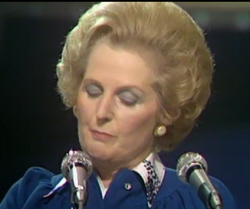The Specials
For those young people whoŌĆÖd grown up after the heyday of mass immigration a new Britain was taking shape around them, unified by a shared love of music and in particular, a band called The Specials.
Within England, cultural diversity had become a controversial issue. For many older people whoŌĆÖd been born into a country that was almost entirely white, the effects of Commonwealth immigration seemed uncomfortable, even alarming.
The Specials and their record label ‘2 ToneŌĆÖ put their home city of Coventry on the British youth culture map.
Adrian Thrills “Here I am, Adrian Thrills, a cub reporter with the New Musical Express, on my way up from London to Coventry.”
Keen as ever to keep its finger on the pulse, the BBC sent the young reporter to catch up with what had quickly become a national phenomenon.
Adrian Thrills “I finally tracked The Specials down to ‘2 ToneŌĆÖ HQ - home of the hits. This is where the assault on the nationŌĆÖs airwaves was planned with the unique mix of punk and reggae.”
The look and sound of a distinctive moment in British pop culture was devised and run from this upstairs bedroom by former art student called Jerry Dammers. In fact, the specials were reviving a musical style from the 1960s. Jamaican Ska was Street music. The songs were about everyday issues. The Specials kept the social angle but applied it to 1970s Britain. Their very first number one was a song about teenage pregnancy.
Racially Diverse Britain
Of course this wasnŌĆÖt the first time that British youngsters had got excited about black music, but what made The Specials special, was that black and white musicians were now playing together and attracting a huge following in the process.
Being black no longer meant that you had to integrate yourself fully into white culture. And at the same time, black culture was becoming increasingly appealing to white audiences. This was multi-culturalism in action, finding its way from the grassroots into the living rooms of millions of British families and just as it was happening in music, so it was also happening in football.
West Bromwich Albion
Today most football supporters taken for granted that their team is a melting pot of races and nationalities. Back in the 1970s, though, most would scarcely have noticed that their teams were almost exclusively white. Towards the end of the decade, though, that began to change and at the forefront was this small West Midlands club - West Bromwich Albion.
In 1978, West Brom were one of the most exciting teams in the country. And that season, they achieved a unique distinction - becoming the first team in EnglandŌĆÖs top division to field three black players.
West Bromwich Albion Black Players
Laurie Cunningham was a Londoner. Cyrille Regis had come to England from French Guiana and Brendan Batson had been born in Grenada.
In 1978, Top of the Pops was possibly the only place where you might see more than an occasional black face. So with more insights than he probably realised, West BromŌĆÖs jovial manager, Ron Atkinson, nicknamed his three black players “The Three Degrees.”
In 1978/79, West Brom celebrated their centenary season. That year they finished third in the first division, their highest position for a quarter of a century. Yet the real highlight of the year was, in many ways, the visit to West Bromwich from the real Three Degrees.
In its way this photograph which shows all six degrees, is a compelling symbol of the changes reshaping not just football, but British society in general.
But of course these changes often seem deeply unsettling to people who vividly remember the days when Britain had been decidedly monocultural. And waiting in the wings, was a politician who was quite happy to speak on their behalf.
Margaret Thatcher

Margaret Thatcher “If we went on as we are, then by the end of the century there would be 4 million people of the new Commonwealth or Pakistan here. ThatŌĆÖs an awful lot and I think it means people are really rather afraid that this country might be rather swamped by people with a different culture.”
Mrs Thatcher was not afraid to court controversy over issues like immigration if she thought it could win her votes. And yet, this was a tactic borne of frustration. Because despite all the economic horrors of the last three years under Labour, despite inflation at 26% and an emergency loan from the IMF, in the summer of 1978 the Tories were still only on level pegging in the opinion polls.
But by the following May, Margaret Thatcher was walking into Downing Street as BritainŌĆÖs first woman Prime Minister.
[amazon text=Amazon&template=carousel&asin=1845135423, 1846687918, 0857389556, 1783055553, 0826429068]
Click Play to rotate the Carousel of The Specials Books
Press and Hold the Forward or Back Buttons to Spin
External Links
The Specials - Official Home Page
